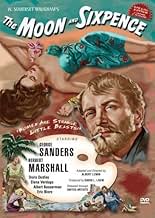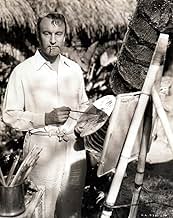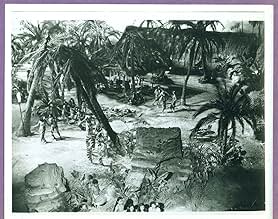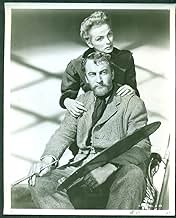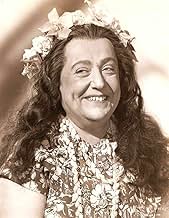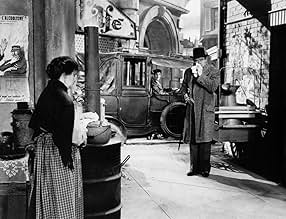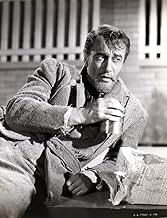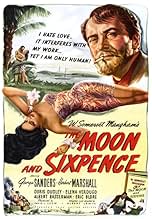Loosely inspired by Gauguin's life, the story of Charles Strickland, a middle-aged stockbrocker who abandons his middle-class life, his family, and his duties to start painting, as he has al... Read allLoosely inspired by Gauguin's life, the story of Charles Strickland, a middle-aged stockbrocker who abandons his middle-class life, his family, and his duties to start painting, as he has always wanted to do. He is from then on a awful human being, wholly devoted to his ideal: be... Read allLoosely inspired by Gauguin's life, the story of Charles Strickland, a middle-aged stockbrocker who abandons his middle-class life, his family, and his duties to start painting, as he has always wanted to do. He is from then on a awful human being, wholly devoted to his ideal: beauty.
- Director
- Writers
- Stars
- Nominated for 1 Oscar
- 4 wins & 2 nominations total
- Dirk Stroeve
- (as Steve Geray)
- Native Boy at Wedding
- (uncredited)
- Man Seated in Paris Dive
- (uncredited)
- Tiare's Cook
- (uncredited)
- Party Guest
- (uncredited)
- Maitland - Wolfe's Valet
- (uncredited)
- The Leper
- (uncredited)
- Col. Fred MacAndrew
- (uncredited)
- Amy Strickland
- (uncredited)
- Tough Bill
- (uncredited)
- French Floozie
- (uncredited)
- Director
- Writers
- All cast & crew
- Production, box office & more at IMDbPro
Featured reviews
Based on Somerset Maugham's novel
As in the later "The Razor's Edge," Maugham, here also played by Herbert Marshall, serves as narrator for most of the film. Sanders is the unpleasant, self-involved Charles Strickland, a stock broker who deserts his family and leaves London to go to Paris and become a painter. There he meets Dirk Stroeve (Geray), who becomes a friend. When Strickland becomes ill, Stroeve over the strong objections of his wife Blanche (Dudley) moves Strickland to their home to nurse him back to health. Stroeve then gets the impression that his wife is in love with Srrickland, and that Strickland has no intention of leaving. So he throws him out. His wife says that she's leaving with him. Stroeve leaves instead.
Strickland eventually tires of Blanche and then leaves for Tahiti. There he continues to paint and even falls in love with a native girl, Ata (Elena Verdugo). There Dr. Coutras (Bassermann) picks up the narration.
As the unapologetic user obsessed with his work, George Sanders is excellent. Like many in the studio system, he was typecast into playing one type of role, but he was capable of so much more. Another revelation in this film is Eric Blore, who was always typecast as a butler. Here he is a different kind of character and is absolutely wonderful. Herbert Marshall does not register much in what is basically a thankless role - he had more to do in The Razor's Edge.
Good movie. If this and Lust for Life are any indication, Gauguin, even if this character just hints at him, was a most unpleasant character.
The Moon and Sixpence
Faithful and effective adaptation of the novel
An emotionally draining original that cannot be remade.
I recently saw this movie for the first time on TCM. It is one of the most "startling" and highly original movies I have seen from that era of filmmaking.
Almost never does a movie affect me emotionally--not only as I saw it but even a couple of weeks later I am still affected by it.
Among the many things that are so powerful is the relentless negativity of the George Sanders' character throughout. And yet he makes us feel he is on a mission to be true to himself and to fulfill his destiny without apology.
To combine these elements in one character is something I have never seen in any movie. It left me confused emotionally and yet felt admiringly of someone who can eschew all human concern for others(with one exception which I will not spoil) to relentlessly pursue what he perceives as his truth and destiny.
It is a brilliant achievement in George Sanders' acting and for the directors' unapologetic vision of the movie.
I have to be careful not to spoil, but among many amazing surprises is how another artists' wife(Blanche Stroeve played by Doris Dudley whom I knew in real life) reacts to Sanders after she, at her husband's insistence, nurses him back to health. It is an amazing scene. Yet somehow we understand that Sander's purpose is so well-defined and his masculinity is so caveman-like that she cannot help but respond to him.
Definitely not politically correct. I cannot imagine a scene like this even being allowed to be shot in this way in any modern movie.
Speaking of political correctness, other surprises abound in this area particularly during the time the Sanders character moves to Tahiti.
Not to spoil but listen closely as a certain older woman who interacts with Sanders describe her long ago love affairs and the character of the men she was involved with.
If any woman was to pine for love affairs like she describes in today's world, she would be denounced by every women's group on the planet. And yet she pines for those days with infectious gusto and enthusiasm.
A movie shot like this today would set women back a couple of hundred years. It could not be remade today and still retain all the wild political incorrectness. Protests and boycotts would stop the movie from being made if word got out of it's script's contents.
A great, emotionally draining, disturbing and thoroughly unique movie that will always stand alone and cannot be remade without huge rewrites.
One brief note of interest. One of the female leads, Doris Dudley, lived about a quarter mile from me in the early 1980's. The location was a little community called Jacobia, Tx. Her obituary says Greenville, Tx. which is also correct.
She invited me and my parents to some kind of little get together at her modest country home. She was outgoing, friendly and yet had a powerful energy to her that somehow made me understand why she was an actress.
She told me she was in the movies many years ago and her movie/stage name was Doris Dudley. She originally introduced herself as Doris Jenkins.
She mentioned that she knew Cary Grant. She may have said she worked with him but I'm not sure. She was in her mid 60's and long since retired from being an actress by the time I met her. She loved her dogs. And shortly after I met her she learned she had terminal cancer and died shortly thereafter. When I asked her about it, I was struck by how unafraid she was of dying. I brought her a little newspaper article about someone beating cancer I thought might cheer her up. But she did not need any help. Her courage in facing death infused me with courage. I shall never forget her.
There is only one biography of her I can find on the internet. She was a lovely, dynamic woman. She was terrific in this movie. I miss visiting with her.
terrific story
Did you know
- TriviaHerbert Marshall plays the writer Geoffrey Wolfe, a fictional alter ego of author W. Somerset Maugham. Marshall played Somerset Maugham in The Razor's Edge (1946), and appeared in several adaptations of Maugham's works, including The Painted Veil (1934) and both the 1929 and 1940 versions of The Letter (1940).
- GoofsStrickland mispronounces Papeete (the capital of Tahiti) as "Pah-peet-ee". The correct pronunciation, as any resident of Tahiti would know, is "Pah-pay-ay-tay".
- Quotes
Geoffrey Wolfe: Why will you never let me meet your husband?
Amy Strickland: He's not at all literary - he'd probably bore you to death.
Geoffrey Wolfe: Does he bore you?
Amy Strickland: I happen to be his wife: I'm very fond of him. He doesn't pretend to be a genius. In fact, he doesn't even make very much money on the stock exchange. But he's awfully good and kind.
Geoffrey Wolfe: I think I should like him very much.
- Alternate versionsThere is a tinted and a color sequence toward the end of the film, both of which have recently been restored, but for many years this film was seen only in black-and-white.
- ConnectionsReferenced in Spring in Park Lane (1948)
- SoundtracksWe, Three Kings of Orient Are
(uncredited)
Traditional
- How long is The Moon and Sixpence?Powered by Alexa
Details
- Release date
- Country of origin
- Language
- Also known as
- W. Somerset Maugham's The Moon and Sixpence
- Production company
- See more company credits at IMDbPro
Box office
- Budget
- $401,000 (estimated)
- Runtime
- 1h 29m(89 min)
- Aspect ratio
- 1.37 : 1

